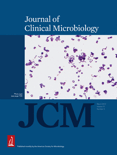
JOURNAL OF CLINICAL MICROBIOLOGY
Scope & Guideline
Pioneering Research for Tomorrow's Healthcare
Introduction
Aims and Scopes
- Clinical Microbiology and Infectious Diseases:
The journal emphasizes research that elucidates the microbiological aspects of infectious diseases, including the characteristics of pathogens, their transmission dynamics, and the clinical implications of these infections. - Antimicrobial Resistance and Stewardship:
A significant focus on studies addressing antimicrobial resistance mechanisms, patterns of resistance, and the impact of antibiotic stewardship programs on clinical outcomes and resistance trends. - Diagnostic Innovations:
Research on the development and validation of novel diagnostic tools, including molecular methods and rapid testing techniques, to improve the identification of pathogens and guide effective treatment. - Epidemiology and Public Health:
Studies that explore the epidemiological patterns of infectious diseases, including outbreaks, risk factors, and the impact of public health interventions on disease control. - Therapeutic Approaches and Treatment Outcomes:
Investigation into the effectiveness of various therapeutic regimens, including novel antibiotics and combination therapies, and their outcomes in clinical settings.
Trending and Emerging
- Metagenomics and Next-Generation Sequencing:
There is a marked increase in studies utilizing metagenomics and next-generation sequencing technologies to understand complex microbial communities and their roles in health and disease. - Impact of COVID-19 on Infectious Disease Epidemiology:
Research examining the consequences of the COVID-19 pandemic on other infectious diseases, including changes in patterns of co-infections and the effects of public health measures on disease transmission. - Antimicrobial Resistance Mechanisms:
In-depth investigations into the genetic and biochemical mechanisms underlying antimicrobial resistance are on the rise, as understanding these mechanisms is crucial for developing effective treatment strategies. - Telemedicine and Remote Diagnostics:
Emerging research into the role of telemedicine and remote diagnostics in managing infectious diseases, particularly as healthcare systems adapt to the challenges posed by the COVID-19 pandemic. - Infection Control and Prevention Strategies:
A growing body of research focusing on infection control practices in healthcare settings, including the effectiveness of various interventions to reduce hospital-acquired infections.
Declining or Waning
- Traditional Culture Methods:
Research focusing on conventional culture methods for pathogen detection has seen a decline, likely due to the rise of molecular diagnostics and rapid testing technologies that offer quicker and more accurate results. - Basic Research in Microbial Physiology:
Studies that primarily focus on basic microbial physiology without direct clinical implications have decreased, as the journal leans more towards research with clear clinical applications and implications for patient care. - Single Pathogen Focus Studies:
Research that examines a single pathogen in isolation is less common, as there is a growing trend towards studying polymicrobial infections and the interactions between multiple pathogens in clinical settings.
Similar Journals

GERMS
Bridging disciplines to combat infectious diseases effectively.GERMS is a multidisciplinary journal published by the EUROPEAN ACAD HIV-AIDS & INFECTIOUS DISEASES, dedicated to advancing knowledge in the fields of epidemiology, immunology, infectious diseases, and microbiology. Since its inception in 2011, the journal has provided a crucial platform for researchers and practitioners to share innovative studies, clinical findings, and public health insights, with an eye on improving health outcomes globally. With an ISSN of 2248-2997 and a consistent publication trajectory leading up to 2024, GERMS is recognized in the third quartile across several categories, reflecting its growing impact and relevance in the scientific community. Authors and readers benefit from a range of access options, fostering the dissemination of vital research findings. As a journal situated in Romania, it also addresses regional health challenges while contributing to the broader discourse on infectious diseases and public health. GERMS is not just a repository of knowledge, but a vital resource for those engaged in combating infectious diseases and promoting health equity.

Reviews and Research in Medical Microbiology
Catalyzing Change in the Study of Infectious DiseasesReviews and Research in Medical Microbiology is a premier academic journal published by LIPPINCOTT WILLIAMS & WILKINS, focusing on groundbreaking research and comprehensive reviews that advance the understanding of medical microbiology. With an ISSN of 2770-3150 and an E-ISSN of 2770-3169, this journal serves as an essential resource for researchers, healthcare professionals, and students dedicated to the study of pathogens, infectious diseases, and microbial mechanisms affecting health. While the journal currently does not offer open access, its rigorous peer-review process ensures that only high-quality, impactful research is disseminated to the scientific community. The journal aims to bridge gaps in knowledge by presenting cutting-edge studies that explore novel therapeutic strategies, diagnostic methods, and the evolving landscape of microbial resistance. Nestled in the heart of Philadelphia, this journal proudly contributes to the advancement of medical microbiology and is an indispensable platform for the publication of critical findings that shape clinical practices and research trajectories in the field.

Infectious Diseases
Fostering Global Collaboration in Infectious DiseasesInfectious Diseases, published by TAYLOR & FRANCIS LTD, is a leading academic journal dedicated to advancing research in the field of infectious diseases and microbiology. With an impressive impact factor and categorized in Q1 in multiple areas including Immunology and Microbiology, this journal serves as a critical platform for researchers, practitioners, and students to disseminate their findings and stay abreast of current advancements. The journal is recognized for its rigorous peer-review process and aims to foster innovation and collaboration across disciplines from 2015 to 2024. It boasts a robust Scopus ranking, positioning it favorably among the top-tier of journals in the relevant fields, making it an essential resource for anyone involved in infectious disease research. Access options are available, ensuring that the latest research is accessible to a global audience, thus emphasizing the journal's commitment to promoting knowledge and understanding in the ever-evolving landscape of infectious diseases.
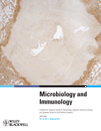
MICROBIOLOGY AND IMMUNOLOGY
Fostering Innovation in Immunology and Virology ResearchMICROBIOLOGY AND IMMUNOLOGY, an esteemed journal published by WILEY, serves as a vital resource for researchers and professionals in the fields of microbiology, immunology, and virology. With its ISSN 0385-5600 and E-ISSN 1348-0421, this journal has been a cornerstone in scientific literature since its inception in 1977, bridging decades of research and innovation through its comprehensive coverage of emerging trends and discoveries. Although this journal operates without open access, it maintains a commendable presence in academic circles, reflected in its 2023 Quartile rankings of Q3 across the categories of Immunology, Microbiology, and Virology. As part of an important discourse in these disciplines, MICROBIOLOGY AND IMMUNOLOGY ensures its scholarly contributions are relevant to both seasoned researchers and emerging scholars. Positioned in a competitive journal landscape, with Scopus ranks indicating a median percentile across its fields, it remains committed to advancing knowledge through peer-reviewed articles, thereby supporting the continuous evolution of its focus areas. The journal's current scope encompasses topics critical for understanding pathogen-host interactions and the immune response, making it a crucial publication for any academic library or individual scholar dedicated to the biological sciences.
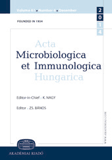
ACTA MICROBIOLOGICA ET IMMUNOLOGICA HUNGARICA
Unveiling the complexities of immune responses.ACTA MICROBIOLOGICA ET IMMUNOLOGICA HUNGARICA is a distinguished academic journal published by AKADEMIAI KIADO ZRT, focusing on significant advancements in the fields of microbiology, immunology, and infectious diseases. Established in 1994, this journal serves as a vital platform for researchers, professionals, and students keen on exploring the complexities of microbial interactions and immune responses. With a current Impact Factor reflecting its rank within the Q3 categories for Immunology, Microbiology, and Infectious Diseases, it retains a critical position in disseminating innovative research. Although not open access, the journal provides extensive insights disseminated through various academic databases, ensuring a broad reach within the scholarly community. Its convergence over three decades indicates a robust commitment to excellence in scientific inquiry and knowledge sharing. As it moves towards the future, ACTA MICROBIOLOGICA ET IMMUNOLOGICA HUNGARICA continues to uphold its legacy of fostering collaborative research initiatives that contribute to the understanding and treatment of microbial diseases globally.

Infectious Microbes & Diseases
Unraveling the complexities of microbes and their impact.Infectious Microbes & Diseases, published by Lippincott Williams & Wilkins, is a premier journal dedicated to the exploration and understanding of infectious diseases, microbiology, and epidemiology. With its focused scope and robust peer-review process, the journal aims to disseminate high-quality research that contributes to advancements in the field, making it an essential resource for researchers, healthcare professionals, and students alike. Established in 2019, it has quickly gained recognition, achieving a Q3 rating in categories such as Epidemiology, Infectious Diseases, and Medical Microbiology in 2023, and ranking in the top half of its field within Scopus metrics. Although currently offered as a subscription-based journal, Infectious Microbes & Diseases significantly enriches its disciplines by inviting innovative research and critical review articles, thus playing a vital role in combating the global challenges posed by infectious diseases.

Mediterranean Journal of Infection Microbes and Antimicrobials
Unlocking insights into the realm of infectious microbes.Mediterranean Journal of Infection Microbes and Antimicrobials is a distinguished open-access journal published by GALENOS PUBL HOUSE, dedicated to advancing the understanding of infectious diseases and microbiology. Since its inception in 2011, this journal has been a vital resource for researchers, professionals, and students interested in the intricate world of microbes and their impacts on human health. With its ISSN 2147-673X, the journal has progressively gained visibility, although it currently holds a Q4 ranking in multiple categories including Immunology and Microbiology, and Infectious Diseases for the year 2023. The journal operates from its headquarters in Istanbul, Turkey, and features a rich array of articles that contribute to the field’s body of knowledge. As a platform enhancing the accessibility of research, it invites submissions from global contributors to foster collaboration and innovation in tackling microbial challenges.
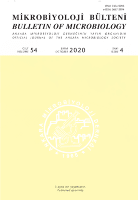
MIKROBIYOLOJI BULTENI
Fostering Knowledge in Immunology and MicrobiologyMIKROBIYOLOJI BULTENI, with ISSN 0374-9096, is a prestigious academic journal published by the ANKARA MICROBIOLOGY SOC, located in Ankara, Turkey. Established in 1973, this journal has been a vital conduit for disseminating research in the fields of Immunology, Microbiology, and Infectious Diseases, garnering a reputation as a significant contributor to the scientific community. The journal is currently ranked in the Q3 category within Immunology and Microbiology (miscellaneous), and Infectious Diseases, indicating its impactful presence amidst contemporary research. With access options that may be restricted, MIKROBIYOLOJI BULTENI actively welcomes submissions that advance the understanding of critical microbiological principles and practices, thereby supporting both national and international research efforts. Researchers, professionals, and students are encouraged to explore the latest findings shared in this journal, as it continually shapes the landscape of microbiology and infectious disease studies through its comprehensive and rigorous peer-reviewed publications.

New Microbiologica
Exploring the vital links between microorganisms and human health.New Microbiologica is a prominent academic journal published by EDIZIONI INT SRL, dedicated to advancing knowledge in the fields of Microbiology and Medicine. Since its inception in 1993, this journal has played a vital role in disseminating cutting-edge research, featuring articles that explore the intricate relationships between microorganisms and human health. With an H-index indicating a robust citation profile and a respectable 2023 Scopus Ranking placing it in the 32nd percentile for medicine microbiology, New Microbiologica resonates well within the academic community. Although not an Open Access journal, it is strategically positioned in Quartile 3 of both Medicine (miscellaneous) and Medical Microbiology categories, which reflects its importance to researchers and professionals seeking valuable insights in their fields. Published in Italy, the journal continues to provide a platform for impactful research through its commitment to high-quality publications, fostering collaboration and innovation among scientists and academics in the ever-evolving landscape of microbiological studies.
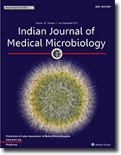
Indian Journal of Medical Microbiology
Discovering Tomorrow's Solutions in Medical Microbiology TodayIndian Journal of Medical Microbiology, published by Elsevier, is a pivotal peer-reviewed journal dedicated to the field of medical microbiology, providing a vital platform for research and scholarship since its inception in 1986. With an Open Access model established in 2001, it ensures the dissemination of scientific knowledge to a global audience, enhancing accessibility for researchers, professionals, and students alike. The journal's scope spans critical areas including immunology, infectious diseases, and microbiology, with an impressive trajectory marked by converged years of publication allowing for a comprehensive exploration of evolving scientific trends. As of 2023, the journal holds a Q3 ranking in Infectious Diseases and Microbiology (medical) and a Q4 ranking in Immunology and Microbiology categories, reflecting its significant yet growing impact in the field. Researchers seeking to contribute to or stay updated on the latest advancements in medical microbiology will find the Indian Journal of Medical Microbiology a valuable resource, as it consistently bridges the gap between emerging science and clinical application.